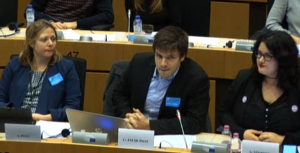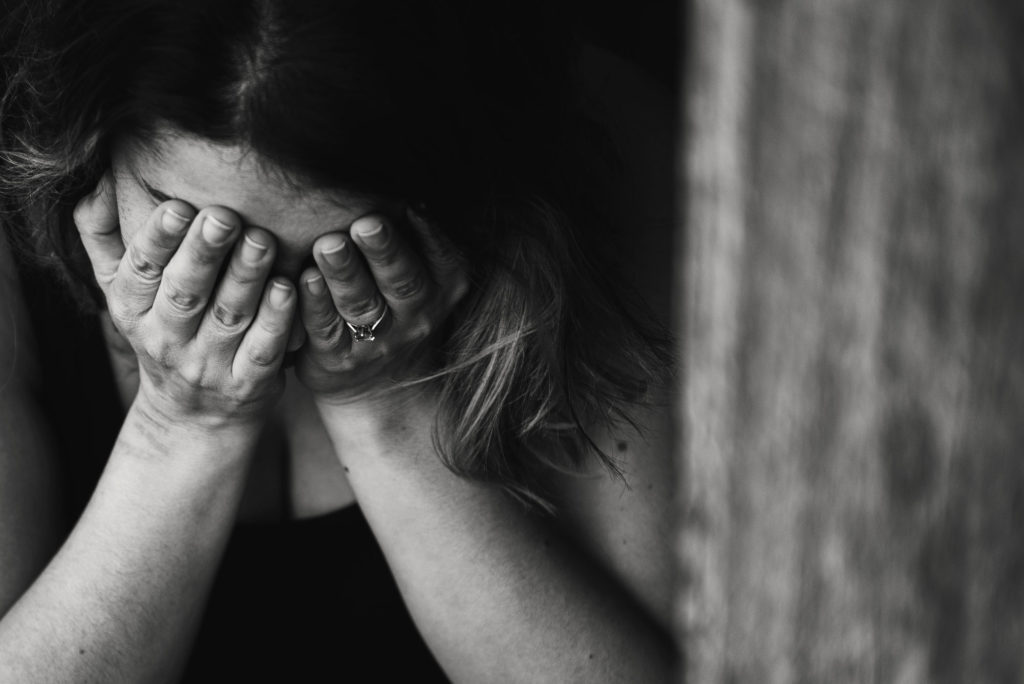Click here for the easy-to-read version
“A life sentence, a loss or a betrayal.” This is how forced sterilisation is experienced by women and girls with disabilities, according to a report by the European Disability Forum (EDF) and CERMI Women’s Foundation.
The international community has widely acknowledged that forced sterilisation is a violation of many human rights. However, it is still happening all over the world, including in Europe. The report comes at a time when this urgent matter has been receiving attention at international levels.
In July 2017, a high-level publication by the Office of the United Nations (UN) High Commissioner for Human Rights urged UN member states to repeal all legislation that allows forced sterilisation, forced abortion, and forced contraception to be carried out.

Guillaume Jacquinot speaking during the hearing, “’Ending forced sterilisation of women and girls with disabilities” at the European Parliament. Still shot from the video by the Group of the Progressive Alliance of Socialists and Democrats.
In December 2017, EDF and MEP Soraya Post (Swedish Feminist Initiative, Progressive Alliance of Socialists and Democrats) co-hosted a hearing on “’Ending forced sterilisation of women and girls with disabilities” at the European Parliament. The event raised awareness on the need to stop forced sterilisation of women and girls with disabilities, and called for the prohibition of all forms of violence against women.
Inclusion Europe participated at the hearing to represent the interests of women with intellectual disabilities, who are a particularly high-risk group for such procedures. “Forced sterilisation is more likely to occur in situations of power imbalance,” emphasised Guillaume Jacquinot, Policy Officer at Inclusion Europe. He explained that abuse happens more often when people are under guardianships or living in institutions, which denies them the right to make their own decisions. In this regard, the Life After Violence project by Inclusion Europe specifically aims to support women who have been subject to violence in institutional settings.
Women making decisions for themselves
Indeed, the report by the EDF and CERMI stresses that informed consent is a fundamental requirement for upholding human rights. It highlights that the UN Convention on the Rights of Persons with Disabilities (CRPD) underlines everyone’s right to make decisions for themselves, rather than have them made by anyone else.
Further exploring the close link between forced sterilisation and the deprivation of legal capacity, the report highlights the following statement of the UN CRDP Committee:
women with disabilities are subjected to high rates of forced sterilisation, and are often denied control of their reproductive health and decision-making, the assumption being that they are not capable of consenting to sex. Certain jurisdictions also have higher rates of imposing substitute decision-makers on women than on men.
Putting this in context, the report says, “the experiences of women affected show that forced sterilisation forms part of a wider paternalistic model and patriarchal system in which women with disabilities are denied their human and reproductive rights.”
The impact of forced sterilisation on girls and women
The report also discusses the mental and physical health consequences of forced sterilisation. It outlines how, along with potential early-onset menopause, osteoporosis and cardiovascular conditions, sterilisation causes trauma. On top of this, there is extra pressure to mental health as victims are subject to stigma about being sterilised.
EDF and the CERMI Women’s Foundation note that sterilisation can make someone more vulnerable to further sexual abuse. Some women and girls are sterilised against their will in their so-called “best interests”, with the idea of “protecting” them against possible future abuse and from future pregnancies. This makes abuse easier to hide, which is especially worrying as sexual abuse towards women with intellectual disabilities is already particularly prevalent. One survey in the Netherlands showed that 2 out of 3 women with intellectual disabilities have been sexually abused, as opposed to 1 in 3 of the general population.
Forced sterilisation in Europe
In Europe, forced sterilisation continues to be performed especially on women and girls with intellectual or psychosocial disabilities. For example, the report looks at Spain, where this practice is ongoing, and recent cases in France and Croatia.
It also looks at the progress that is being made towards respecting the right to informed consent. For example, the right of people with intellectual disabilities to make their own decisions was enshrined in law by Ireland’s 2015 Assisted Decision-Making (Capacity) Act. Sweden and Germany have replaced their guardianship systems in favour of supported decision-making.
The European Union should ratify the Istanbul convention
The report includes recommendations to the EU and its Member States, as well as to civil society. For example, it says that the EU should set up a coordinating body to end violence against women and girls, under the umbrella of the European Commission’s work on equality between women and men.
The report also underlines that the recommendations on forced sterilisation and legal capacity that the UN CRPD issued to the EU should be implemented.
Furthermore, it says that EU institutions and Member States should ratify the Council of Europe’s Convention on the prevention and combating of violence against women and domestic violence, known as the Istanbul convention. When they do, it is vital to ensure that forced sterilisation is considered an offence, and that victims have access to support.
Organisations that work for and with people with disabilities have a crucial role in ending forced sterilisation of people with disabilities. The report draws special attention to the need for guidance and support in families of people with disabilities who are most at risk of having their daughter or son sterilised.
Additional information
Access the full report here.
Watch the video of the hearing at the European Parliament on 5 December 2017.
Learn more about our project, “Life After Violence”.

Easy-to-read version
Click on a word which is in bold to read what it means.
The European Disability Forum and the CERMI Women’s Foundation
have made a report on the forced sterilisation
of women and girls with disabilities.
Forced sterilisation is when people are forced to have an operation
that stops them having babies.
Forced sterilisation happens in lots of countries,
including in Europe.
People all over the world have recognised
that forced sterilisation is a bad thing.
It goes against human rights.
In July 2017, a report by the United Nations said that the laws
which allow forced sterilisation should be changed.
In December 2017, there was an event at the European Parliament
to talk about stopping sterilisation of women and girls with disabilities.
Inclusion Europe went to this event.
We represent people with intellectual disabilities.
Women with intellectual disabilities are at a higher risk than other people
of being forced to get sterilised.
Our Policy Officer, Guillaume Jacquinot,
explained that abuse happens more often
when people are not allowed to make their own decisions.
For example, when they are under guardianships or live in institutions.
We are running a project called Life After Violence
to support women who have suffered violence in institutions.
Women making decisions for themselves
The report by the European Disability Forum
and the CERMI Women’s Foundation says
it is very important that people agree to what happens to them.
The UN CRPD underlines
everyone’s right to make decisions for themselves.
The report also says that in some places,
women with disabilities are not allowed to make their own decisions
as much as men with disabilities.
It says this is because in some cultures,
women are not allowed to make their own decisions.
The impact of forced sterilisation on girls and women
The European Disability Forum and the
CERMI Women’s Foundation also looked at
how forced sterilisation affects girls and women.
Women and girls who are sterilised are at a higher risk of
problems with their periods, bones, and heart.
Being sterilised also causes stress.
If a woman or girl is sterilised, she cannot become pregnant.
This makes it harder to prove she has been raped.
So it is easier to hide when a sterilised woman has been abused.
This is very worrying because women with intellectual disabilities
are already more likely to be sexually abused than other women.
Forced sterilisation in Europe
In Europe, forced sterilisation happens to
women and girls with intellectual disabilities more than other people.
For example, it stills happens in Spain.
There have also been recent cases in France and Croatia.
Some countries are trying to improve the situation
and let women make their own decisions.
For example, Ireland has a new law to help make sure
people with intellectual disabilities decide things for themselves.
What the European Union should do to stop forced sterilisation
The report says what countries in Europe
should do to stop forced sterilisation.
For example, it says the European Union needs to focus on this topic
as part of its work to stop violence against women.
The UN CRPD has given some ideas on
how the EU can improve the situation.
The report says the EU should listen to what the UN CRPD has said.
The report which talks about what the United Nations Committee would like
the European Union to do about topic.
It is very important that forced sterilisation is made illegal.
There needs to be support for women and girls who have been sterilised.
Organisations that work for and with people with disabilities
are important to helping end forced sterilisation.
It is important that families of people with disabilities are supported
so they understand the risks of forced sterilisation.






